Scandlines Orders Onshore Charging System for Puttgarden
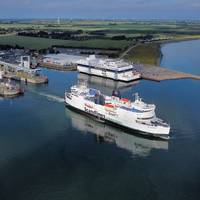
Scandlines has contracted Norwegian Electric Systems (NES) to deliver an onshore charging system to the ferry operator’s berth in Puttgarden, Germany.NES will deliver the system and connect the equipment to the power grid of the regional grid operator, Schleswig-Holstein Netz. The required components onshore include a 30MVA grid transformer, medium and low voltage transformers, and switchboards, in addition to control system and data collection system. NES will also deliver additional equipment to the ferry.Scandlines’ new zero direct emissions ferry…
Scandlines Launches Zero Emissions Ferry
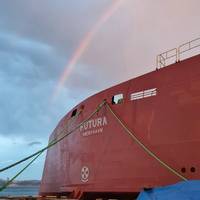
Scandlines’ new zero direct emissions freight ferry has been launched at the Cemre Shipyard in Turkey.The ferry will be name Futura and deployed on the Fehmarn Belt between Germany and Denmark (Puttgarden-Rødby) in 2024. It will have a 10MWh energy storage system, the world's largest lithium-ion battery bank to date, which has been supplied by Swiss manufacturer, Leclanché.The 8.6 meter high ferry charger tower, developed by the German company, StemmannTechnik, is being prepared for installation at ferry berth 3 in Denmark’s Rødbyhavn.
Battery-Electric Surge: ESS Scales Up in Maritime
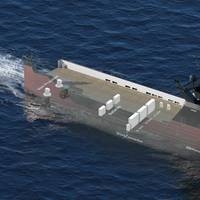
Ask the right government department in any G7 state and you’ll find funding to put battery power for your vessel. Beyond funds, new battery makers and system integrators are ironing out safety issues, and a growing number of giga-sized cell factories offer hope that costs will fall for marine energy storage, as ESS choice grows. Efforts are also underway to recycle rare earth elements and to augment or greenify staggeringly high plant electricity inputs. Apart from funding, the drivers of change include constraints on shipping in Emissions Free Areas like the fjords of Norway…
Kongsberg's Propulsion and Control System for Scandlines' Zero-emission Ferry
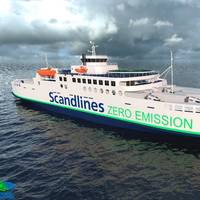
Norway's Kongsberg Maritime said Friday it would supply a complete propulsion and control system package for a forthcoming Scandlines zero-emissions ferry which, when built, is destined to be the world’s largest all-electric double-ended ferry. The ferry has been designed by LMG Marin AS in Norway and will be constructed at Cemre Shipyard in Turkey, in cooperation with Scandline’s vessel-newbuild experts. The freight ferry is expected to enter service in 2024. The new 147.4 meters…
Scandlines Orders Zero-emissions Ferry from Cemre
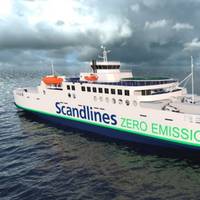
Denmark-headquartered Scandlines said it has entered into a contract with Turkey's Cemre Shipyard to build an emissions-free freight ferry for the Puttgarden-Rødby route. The ferry will enter service in 2024.With a crossing time of one hour, the ferry is emissions free. It can also be operated as a hybrid ferry like the current passenger ferries on the Scandlines routes between Germany and Denmark. As a hybrid ferry, the crossing time is 45 minutes.Initially, the ferry will exclusively charge in Rødby.
Scandlines Preps Second RoPax for Rotor Sail Install
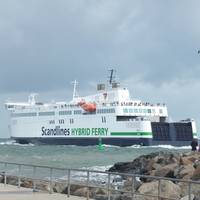
Denmark-headquartered ferry operator Scandlines has opted to install a rotor sail on board a second vessel in its fleet after equipping the hybrid ferry Copenhagen with its first wind auxiliary propulsion unit in 2020.Berlin, a sister vessel to Copenhagen, also operates on the Rostock-Gedser route but, unlike Copenhagen, is flagged by Germany.Scandlines has had more than a year to collect data on how the Norsepower rotor sail works on Copenhagen, and what effect it has on the route.Scandlines’ COO…
The Shipping Industry Embraces Battery Power
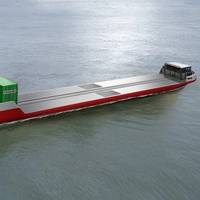
The past decade has seen tight restrictions on emissions from vessels, notably with a 2015 move to a .10% sulfur maximum in Emission Control Areas (ECA) in North America and in northern Europe. As the International Maritime Organization (IMO) now shapes shipping’s decarbonization future, shipowners are looking at transitions away from fossil fuels. Among the myriad of alternatives are lithium ion batteries and some early forays into hydrogen fuel cells.To date, large batteries are used on short runs…
Norsepower Secures Its First Newbuild Order
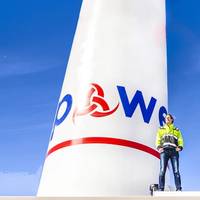
Wind propulsion systems provider Norsepower said it has secured a contract to install five tilting rotor sails on board a large bulk carrier for an anonymous shipowner, marking the Finnish company's first installation aboard a newbuild vessel. Preparations are currently underway with the installation scheduled to take place in 2021.Norsepower’s fuel-saving rotor sail auxiliary propulsion solution, which can be installed on new vessels or retrofitted on existing ships, is a modernized version of the Flettner rotor…
Norsepower, SWS Complete VLCC Project
Finnish provider of auxiliary wind propulsion systems for ships Norsepower has completed a joint project with China’s Shanghai Waigaoqiao Shipbuilding (SWS) for the development of an energy-efficient dual-fuel 300,000 dwt very large crude carrier (VLCC) design.The design has already received an approval in principle (AiP) from classification societies Lloyd’s Register and ABS.Under the agreement, Rotor Sails were implemented in the VLCC design for improving the fuel efficiency and reducing emissions, the engineering company said.The impact of the installation of Norsepower’s Rotor Sail solution, including a review of structural reinforcement and visibility calculation…
WASP Sets Sail on its 3-Year Voyage
The WASP (Wind Assisted Ship Propulsion) project, funded by the Interreg North Sea Europe program, part of the European Regional Development Fund (ERDF) to the tune of €3.4 million has been officially approved and launched.The project brings together universities, wind-assist technology providers with ship owners to research, trial and validate the operational performance of a selection of wind propulsion solutions thus enabling wind propulsion technology market penetration and contributing to a greener North Sea transport system through harvesting the regions abundant wind potential.This fully aligns with the wider programs’ objective of promoting the development and adoption of products…
OGCI Invests in Wind Power for Ships
OGCI Climate Investments has led an EUR 8 million investment round in Norsepower, along with current investors, to accelerate Norsepower’s growth on global markets.The investment enables Norsepower to scale up production at its manufacturing facilities as part of a next phase of commercialization triggered by demand for its renewable wind energy propulsion systems, said a press release from Norsepower Oy Ltd., the provider of low maintenance, software operated, data verified auxiliary renewable wind energy propulsion systems.The increased take-up comes at a time when the international shipping industry looks to offset expensive fuel…
Norsepower’s Rotor Sail on Hybrid Ferry
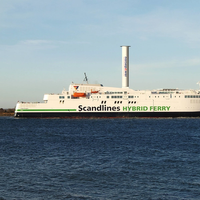
Ferry operator Scandlines has announced that it has signed an agreement with Norsepower Oy Ltd, leading clean technology and engineering company pioneering modern wind propulsion technology, to install Norsepower’s Rotor Sail Solution on board the M/V Copenhagen, a hybrid passenger ferry.Operating between Rostock in Germany and Gedser in Denmark, the M/V Copenhagen belongs to the world’s largest fleet of hybrid ferries, which combines diesel and battery power. Since 2013, Scandlines…
Denmark Supports Development Electric Ferries
Electric ferries are in a rapid development, and the Danish Maritime Authority (DMA) is actively engaged in ensuring that safety is part of the innovative efforts taking place in the Blue Denmark.The DMA is working in a joint project with the industry, other authorities and classification societies to promote understanding of the use of lithium-ion batteries in the maritime industry. With a particular focus on safety.Denis Cederholm-Larsen, Senior Ship Inspector at the Danish Maritime Authority said: "The project's results is to provide a common understanding of the use of lithium-ion batteries in the maritime industry, which will benefit both authorities and the industry."The project is expected to be completed during the summer of 2019.
HH Ferries Launches Battery-powered Passenger Vessels
Swedish HH Ferries Group has inaugurated the two ferries Aurora and Tycho Brahe as the world’s largest battery-powered passenger ferries on the route between Helsingborg, Sweden and Helsingör, Denmark.A press release from the owner of the ferry route which is marketed under the trademark Scandlines Helsingborg-Helsingör quoted Johan Röstin, CEO as saying: “Today’s official inauguration marks a milestone for HH Ferries Group’s green strategy. The ambitious project reduces the company’s total emissions of CO2, NOx and particles by 65% when the two high-frequency ferries are powered by green electricity."He added: "That is great news for the environment in and around Öresund and for customers and inhabitants in our local area.
DNV GL JDP for Marine Batteries
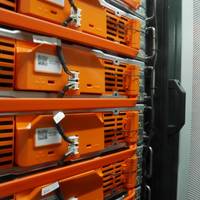
Classification society DNV GL has announced the launch of a Joint Development Project (JDP), designed to advance the understanding of the use of lithium-ion batteries in the shipping industry. More than a dozen partners from the entire value chain have joined the initiative, including flag states, research institutions, battery and propulsion suppliers, fire detection and extinguishing system providers, and ship owners, operators and yards. “Including batteries in ships, whether as a hybrid or fully electric system…
Denmark, Germany, Sweden Ferry Traffic Resumes
Ferries resumed crossings between Germany and Denmark after a brief halt on Wednesday following a threat made to local police by phone, Danish police said. The police said in a statement that it had searched and cleared the first ferries at the Danish ports Rodby and Gedser and allowed them to resume operations. Ferry routes between Denmark and Sweden, which had also been suspended due to the threats, were resumed shortly after, the police said. Ferry operator Scandlines said Wednesday it has evacuated all its ferries in the Danish town Rodby and suspended ferry traffic between Denmark and Germany due to security reasons following a telephone threat.
Corvus, Scandlines Ink 10-year Service Deal
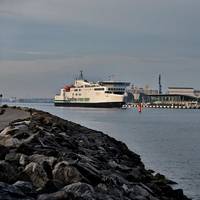
Corvus Energy said it has been awarded a 10-year service and maintenance agreement for the entire Scandlines hybrid ferry fleet. The contract includes both traditional service and maintenance of the fleets’ energy storage systems, plus Corvus’ remote condition-based monitoring service, Watchman. The first ferry operator to build and operate large ROPAX (roll-on/off passenger) hybrid ferries that combine traditional diesel power with advanced battery power, Scandlines utilizes Corvus’ lithium-ion based energy storage systems throughout the entire fleet to provide the battery power.
Scandlines new ferries on Rostock-Gedser route
On Sunday evening 5 February 2017, the two new hybrid ferries M/V Berlin and M/V Copenhagen went into ordinary service on the Rostock-Gedser route. In May and December 2016, Scandlines inserted two new ferries on the Rostock-Gedser route. Until then the route had been operated by two former Great Belt ferries, which were no longer able to meet the capacity requirements. For the first time in history, two new ferries were especially designed for the route as Scandlines wanted to give the customers a special maritime experience on board as well as increase the effectiveness of the service. The vessels were originally fitted with a combined diesel mechanic and diesel electric propulsion system.
Scandlines’ Deploys New Ferry
On Wednesday 21 December 2016, Scandlines’ second new hybrid ferry for the Rostock-Gedser route, M/V Copenhagen, will carry passengers for the first time when it departs from Gedser towards Rostock at 09:00. Scandlines new hybrid ferry was registered 19 December 2016 and departed the same day from the Danish yard FAYARD A/S. 20 December 2016 it was practicing between Rostock and Gedser and today Wednesday 21 December 2016 at 09:00 from Gedser in Denmark the ferry will go into ordinary service. M/V Copenhagen is the second of two new hybrid ferries for the Rostock-Gedser route. M/V Copenhagen replaces M/V Kronprins Frederik, which will be used as a replacement ferry on both the Rostock-Gedser and Puttgarden-Rødby routes.
Scandlines' Volume Zooms
Scandlines can look back at a very good high season in 2016. Especially the new hybrid ferry of the shipping company, the M/V Berlin, which was put into service in May on the route Rostock-Gedser, contributed to the growth in the number of transported vehicles. In July and August, Scandlines’ new hybrid ferry succeeded in breaking its own record numerous times. Thus, M/V Berlin transported no less than 39,451 cars in June. The highest number of cars on one crossing was reached on Saturday 27 August 2016 at 13:00 from Gedser, when 351 cars rolled onto the new hybrid ferry. The positive trend continued for the rest of the summer. During Wednesday 14 September 2016 550 lorries drove on board M/V Berlin, thus breaking the previous record of 427 lorries from 01 June 2016.
PBES Lithium Energy Storage for HH Ferries
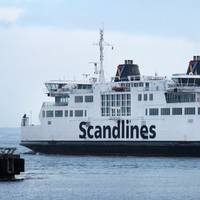
Plan B Energy Storage (PBES) said it has secured the energy storage supply contract for the two largest battery-powered ferries in the world. Each of the two Scandlines Helsingborg-Helsingör ferries will have 4.16 MWh batteries to provide power for primary propulsion. The fully electric ferries will carry their part of more than 7.4 million passengers and 1.9 million vehicles annually with zero emissions. The energy storage system, designed by PBES with a proprietary liquid cooling system that provides a higher level of safety to marine customers…
Scandlines’ New Hybrid Ferry Named MV Copenhagen
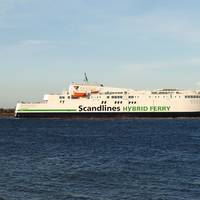
The second of Scandlines’ two new hybrid ferries for the Rostock-Gedser route was named M/V Copenhagen during a ceremony at the Danish shipyard FAYARD A/S on October 28, 2016. In his speech to the some 180 guests in attendance, Thomas Andersen, CEO of FAYARD A/S, thanked Scandlines for the confidence which the shipping company has shown the yard and he compared the new ferry with Hans Christian Andersen’s ugly duckling that finally turned into a beautiful swan. The new ferry M/V Copenhagen…
Hybrid Ferry uses Energy Storage System from Corvus Energy
Scandlines has named their newest hybrid ferry, the M/V Copenhagen. As part of Scandlines’ ambitious environmental strategy, the new hybrid ferry will join the world’s largest fleet of hybrid ferries, utilizing a low emission and fuel saving diesel electric hybrid propulsion system powered by a Corvus Energy ESS (Energy Storage System). The M/V Copenhagen is the sixth Scandlines hybrid ferry to utilize a Corvus ESS. This new hybrid ferry will soon join its sister ship M/V Berlin, also powered by a Corvus ESS, in servicing the crossing between Rostock, Germany and Gedser, Denmark. The M/V Copenhagen is 169.5m long and 25.4m wide, providing double the capacity for vehicles (460 cars or 96 transport trucks), and the modern, spacious onboard facilities have enough space for 1,300 passengers.






